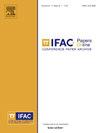基于非指定值估计的对称Kullback Leibler散度实验设计
Q3 Engineering
引用次数: 0
摘要
在这项工作中,我们提出了一种基于对称Kullback Leibler散度(SKLD)的实验优化设计(DOE)方法,以及实验数据矩阵设计中未指定值的估计。使用SKLD作为最优性标准,而不是各种现有的字母最优性标准,有助于合并最终用户期望的估计性能。在实验噪声为高斯且不相关的情况下,该方法求解的是一个混合整数非线性规划问题。这个问题是np难解的。在此基础上,提出了一种新的启发式求解策略,迭代地、顺序地求解所提出的问题。特别是,MINLP问题被分成两个子问题:(i)非线性规划(NLP)问题:估计最优未指定值;(ii)非线性整数规划(IP)问题:获得最优DOE。这两个子问题依次迭代求解,直至收敛。所提出的求解策略保证了SKLD值的递减行为。在一个实例和一个材料合成问题上验证了所提出的求解策略的有效性,并与Fedorov交换算法、前向贪婪搜索算法以及GAMS环境下一些流行的MINLP求解器进行了性能比较。结果表明,所提出的求解方法优于大多数其他方法。本文章由计算机程序翻译,如有差异,请以英文原文为准。
Symmetric Kullback Leibler divergence-based design of experiments with estimation of unspecified values
In this work, we propose a Symmetric Kullback Leibler divergence (SKLD)-based approach for optimal Design of Experiments (DOE) along with estimation of unspecified values in the design of experiments data matrix. Using SKLD as optimality criteria as opposed to various existing alphabetic optimality criteria, facilitates the incorporation of end-user desired performance of estimates. For the case when experimental noise is Gaussian and uncorrelated, the proposed approach results in a Mixed Integer Non-Linear Programming (MINLP) problem. This problem is NP-hard to solve. Hence, a novel heuristic solution strategy is also proposed which solves the proposed problem iteratively and sequentially. In particular, the MINLP problem is split into two sub-problems: (i) Non-Linear Programming (NLP) problem: to estimate optimal unspecified values, and (ii) Non-Linear Integer Programming (IP) problem: to obtain optimal DOE. These two subproblems are solved sequentially and iteratively until convergence is reached. The proposed solution strategy guarantees the decreasing behaviour of SKLD value. The efficacy of the proposed solution strategy is tested on an illustrative example and a Material synthesis problem, and performance is compared with Fedorov exchange algorithm, Forward Greedy search algorithm, and some of the popular MINLP solvers available in GAMS environment. Results demonstrate that the proposed solution approach outperforms most other methods.
求助全文
通过发布文献求助,成功后即可免费获取论文全文。
去求助
来源期刊

IFAC-PapersOnLine
Engineering-Control and Systems Engineering
CiteScore
1.70
自引率
0.00%
发文量
1122
期刊介绍:
All papers from IFAC meetings are published, in partnership with Elsevier, the IFAC Publisher, in theIFAC-PapersOnLine proceedings series hosted at the ScienceDirect web service. This series includes papers previously published in the IFAC website.The main features of the IFAC-PapersOnLine series are: -Online archive including papers from IFAC Symposia, Congresses, Conferences, and most Workshops. -All papers accepted at the meeting are published in PDF format - searchable and citable. -All papers published on the web site can be cited using the IFAC PapersOnLine ISSN and the individual paper DOI (Digital Object Identifier). The site is Open Access in nature - no charge is made to individuals for reading or downloading. Copyright of all papers belongs to IFAC and must be referenced if derivative journal papers are produced from the conference papers. All papers published in IFAC-PapersOnLine have undergone a peer review selection process according to the IFAC rules.
 求助内容:
求助内容: 应助结果提醒方式:
应助结果提醒方式:


